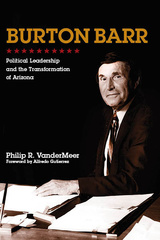Call Him Mac
Ernest W. McFarland, the Arizona Years
By Gary L. Stuart; Foreword by Michael Daly Hawkins
The University of Arizona Press, Sentinel Peak Books
The political life of Ernest W. McFarland—lawyer, judge, senator, governor, Arizona Supreme Court justice, and businessman—is well documented. Less known is his life as a family man, country lawyer, rural judge, and visionary.
In Call Him Mac, Gary L. Stuart renders a nuanced portrait of a young, ambitious, restless, and smiling man on the verge of becoming a political force headed for the highest levels of governance in Arizona and America. Stuart reveals how Mac became an expert on water law and a visionary in Arizona’s agricultural future. Using interviews with friends and family and extensive primary source research, Stuart spotlights Mac’s unerring focus as a loving husband, father, and grandfather, even in times of great personal tragedy. Mac’s commitments to his family mirrored his sense of fiduciary duty in public life. His enormous political successes were answers to how he dealt with threats to his own life in 1919, the loss of his first wife and three children in the 1930s, and a political loss in 1952 that no one saw coming.
Stuart writes the little-known story of how Arizona’s culture and citizens shaped this energetic, determined, likable lawyer. The fame Mac created was not for himself but for those he served in Arizona and beyond. Mac’s unparalleled political success was fermented during his early Arizona years, the bridge that brought him to his future as an approachable and likable elder statesman of Arizona politics.
In Call Him Mac, Gary L. Stuart renders a nuanced portrait of a young, ambitious, restless, and smiling man on the verge of becoming a political force headed for the highest levels of governance in Arizona and America. Stuart reveals how Mac became an expert on water law and a visionary in Arizona’s agricultural future. Using interviews with friends and family and extensive primary source research, Stuart spotlights Mac’s unerring focus as a loving husband, father, and grandfather, even in times of great personal tragedy. Mac’s commitments to his family mirrored his sense of fiduciary duty in public life. His enormous political successes were answers to how he dealt with threats to his own life in 1919, the loss of his first wife and three children in the 1930s, and a political loss in 1952 that no one saw coming.
Stuart writes the little-known story of how Arizona’s culture and citizens shaped this energetic, determined, likable lawyer. The fame Mac created was not for himself but for those he served in Arizona and beyond. Mac’s unparalleled political success was fermented during his early Arizona years, the bridge that brought him to his future as an approachable and likable elder statesman of Arizona politics.
An iconic Arizona story worthy of Gary L. Stuart’s talents.’—Mary M. Schroeder
‘Stuart captures the essence of a humble man who, despite innumerable tragedies, accomplished perhaps more than any other leader in modern history. Ernest McFarland was the workhorse of Arizona—while other politicians were simply show horses.’—Chris Hartman
'Stuart’s new book presents fresh insights about McFarland, an extraordinary individual who overcame illness and tragedy to accomplish, gracefully, so much vital work.’—Douglas C. Towne
‘Arizona legal historian Gary L. Stuart has reached a new pinnacle of success with his latest biography, Call Him Mac: Ernest W. McFarland, the Arizona Years. Stuart’s scholarship and passion for the ‘service above self’ life of Senator McFarland—and the role he played in shaping post–World War II America and his beloved state of Arizona—will remind readers of why we owe so much to the ‘Greatest Generation.’’—Stuart Rosebrook
‘Between 1936 and 1971 Ernest McFarland had the rare distinction of winning the triple crown of politics in the United States. He was elected to the U.S. Senate, where he became the Senate majority leader, and he served as Arizona’s governor and as the state’s chief justice of the Supreme Court. He shined in all areas, leading the effort to pass the federal GI Bill, advocating for the state’s economic and environmental issues, and writing the court’s Miranda decision to protect the rights of the accused to an attorney. His career certainly ranks him at the top of the many illustrious Arizona politicians of the twentieth century.’—James W. Johnson
Gary L. Stuart is a lawyer, law professor, and author of eleven books, including The Gallup 14, a novel based on a notorious 1930s court case in New Mexico; Innocent Until Interrogated: The True Story of the Buddhist Temple Massacre and the Tucson Four; Miranda: The Story of America’s Right to Remain Silent; and Anatomy of a Confession: The Debra Milke Case. He lives in Phoenix.









